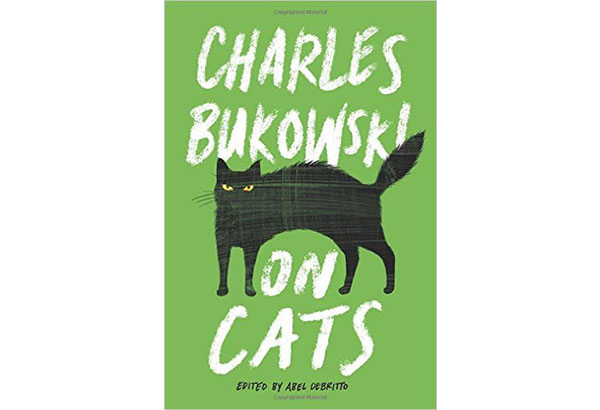Cool for cats
On Cats By Charles Bukowski 118 Pages Available At National Book Store
In life, you’ve got your cat people and you’ve got your dog people. Poet Charles Bukowski was a cat person, and he and his wife would take in up to nine stray cats at a time when he was living and writing. Cats calmed him down, he said; helped him study life and behavior. They were fighters and survivors, and maybe that’s why they were his soul companions.
Bukowski’s cats make frequent appearances in his poems and fiction, and so we have a collection of his feline musings called On Cats, edited by Abel Debritto. It’s a slim little volume, peppered with photos of Bukowski’s cats from his archives (with names like Ting, Ding, Beeker, Bhau, Feather and Beauty). It follows a couple other Bukowski volumes put out by Harper Collins in a similar whimsical vein — one on love, one on erections.
Yes, there are cat people, and there are those who prefer the Beatles to the Stones, or Elvis over Sinatra. Bukowski didn’t understand dogs, but would rhapsodize over cats, their eerie calm and eternal nature (“all black, the perfect animal, each movement slides through space without friction, he’s the leopard, those yellow eyes look at you and say: kill or be killed. He is centuries old…”). They represented complete chill to this writer who had his human demons, left and right.
Bukowski reminds you a bit of Elliot Gould’s Philip Marlowe in The Big Sleep, the Robert Altman version that was a perfect snapshot of ‘70s California inherited from the turbulent ‘60s: a post-hungover, washed-out shrug, with private eye Gould being awoken from a 4 a.m. nap by a hungry housecat, forced to go out to an all-night supermarket for cat food. He does it, and the cat still acts finicky. Bukowski would understand that kind of attachment to felines.
So why are cats important? And why do they feed his writing?
The writer puts it best prosaically: “Animals are inspirational. They don’t know how to lie. They are natural forces. TV can make me ill in five minutes, but I can look at animals for hours and find nothing but grace and glory, life as it should be.”
Bearing in mind that cats played only a fleeting role in Bukowski’s prolific writing before his death in 1994, they still tend to fuel a lot of his philosophy. In these bits and pieces, culled from published and unpublished material, the cats are like character actors who keep turning up — barfly Norm on Cheers, the nosy neighbor in Bewitched. They start taking on personalities, and Bukowski draws out their habits and predilections (though not to the baroque extent that T.S. Eliot or Andrew Lloyd Webber did).
Though cats are mostly cool, they also represent something primal and dark for Bukowski. His cats liked to scrape, and often had scratched-up eyes, maimed tails or cauliflower ears from fighting. He spends pages ruminating over a cat (Ting) that survived being shot, run over and having its tail cut off: somehow this tenacity matters to the poet even more than Shakespeare. (When asked by an interviewer if he was influenced by French writer Celine, Bukowski held up his wretched cat by the scruff and said, “No, by what happens, by things like this! By this!”)
Bukowski was a Beat-influenced writer, so maybe that old Beatnik term (“Cat”) also plays a part. He jabs at his words, his loose-limbed impressions, like a cat distractedly flicking its paw at a mouse. And from the well of the feline’s centuries-old serenity, he occasionally draws fresh nectar.
This is a book for pet lovers, though they may get hung up on Bukowski’s frequent musings on rough cat sex, his various cats’ balls, and the condition of their many injuries, which is probably a precondition for taking them in: the poet looks at his stray animals as fighters, much as he sees himself at times, taking on a drunk or bully (think of Mickey Rourke’s rummy performance as Bukowski in Barfly, led from one bar fight to the next by his peculiar code of honor). For the poet, cats are mirrors of humanity, and in his odd vision, cats come out much better in the measure of things. Not only that, but he thinks they’ve got the eternity thing figured out. Noting that ancient Egyptians were buried with their cats (never their dogs), he calculates how much a cat owner’s life is extended:
Having a bunch of cats around is good. If you’re feeling bad, you just look at the cats, you’ll feel better, because they know that everything is, just as it is. There’s nothing to get excited about. They just know. They’re saviors. The more cats you have, the longer you’ll live. If you have a hundred cats, you’ll live ten times longer than if you have ten. Someday this will be discovered, and people will have a thousand cats and live forever.
Is any of this cat worship quantifiable? Can Bukowski back up his claims? Doesn’t matter. Some people are just cat people. There is no explaining these things.

















